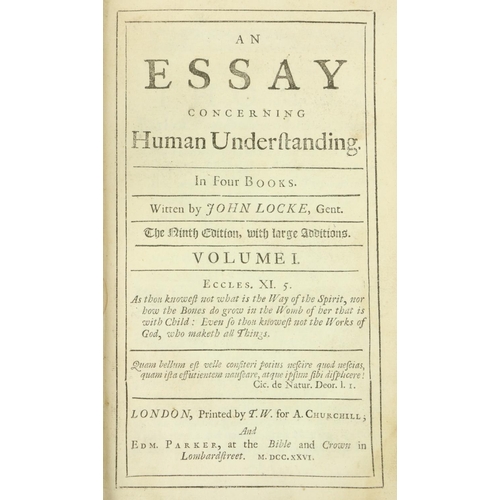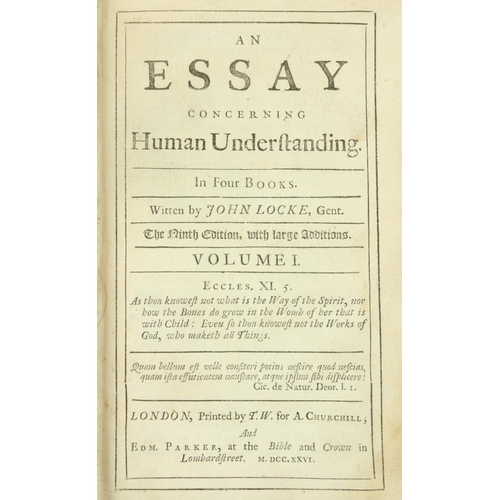LOCKE, John (1632-1704). An Essay concerning Human Understanding. In four books . London: Eliz. Holt for Thomas Basset, 1690. Median 2 o (322 x 191 mm). Collation : A 4 a 2 (title, author's dedication to the eighth Earl of Pembroke, epistle to the reader, errata); B-Z 4 Aa 4 (text Books I-II); Bb-Zz 4 Aaa-Ccc 4 (text Books III-IV, table of contents). Title within double-rule border and with type-ornament vignette. (Small paper flaw on Oo3 catching a few letters, some very occasional minor spotting, mostly marginal, otherwise very fine and crisp.) Contemporary English vellum, overlapping fore-edges (hinges cracked); cloth slipcase. Provenance : Andrew McDowall (1685-1760), Lord Bankton, author of An Institute of the Laws of Scotland in Civil Rights , published 1751-53 (inscription on title verso; bookplate) -- list of books in an early hand on rear flyleaf -- possibly George Buchanan (ca 1790-1852), Scottish civil engineer and author of several scientific treatises (faintly impressed 19th-century stamp on front flyleaf) -- purchased from Dawsons, London, 21 March 1967. A CHOICE COPY OF THE FIRST EDITION OF LOCKE'S FUNDAMENTAL WORK, FIRST ISSUE, with uncancelled title. In Locke's great work is proposed the first modern theory of human knowledge, taking up the challenge proposed by Bacon. Although begun as early as 1671, it was finally brought into order during the years that Locke was an exile in Holland (January 1684-February 1688) in the company of a distinguished literary circle. In Book I, Locke rejected the doctrine of the "innate idea," maintaining that all knowledge is based on experience. Locke investigates the mechanism of comprehension, analyses the extent of the human ability to apprehend ideas and to what extent the mind can understand the universe. His penetrating work led John Stuart Mill to dub him the "unquestioned founder of the analytic philosophy of mind," and indeed his method and argument so permeated the philosophy of the following generations that it is hard to perceive of the world without the influence of his ideas. Grolier English 36; Pforzheimer 600; PMM 164; Wing L-2739. A VERY FINE COPY.
LOCKE, John (1632-1704). An Essay concerning Human Understanding. In four books . London: Eliz. Holt for Thomas Basset, 1690. Median 2 o (322 x 191 mm). Collation : A 4 a 2 (title, author's dedication to the eighth Earl of Pembroke, epistle to the reader, errata); B-Z 4 Aa 4 (text Books I-II); Bb-Zz 4 Aaa-Ccc 4 (text Books III-IV, table of contents). Title within double-rule border and with type-ornament vignette. (Small paper flaw on Oo3 catching a few letters, some very occasional minor spotting, mostly marginal, otherwise very fine and crisp.) Contemporary English vellum, overlapping fore-edges (hinges cracked); cloth slipcase. Provenance : Andrew McDowall (1685-1760), Lord Bankton, author of An Institute of the Laws of Scotland in Civil Rights , published 1751-53 (inscription on title verso; bookplate) -- list of books in an early hand on rear flyleaf -- possibly George Buchanan (ca 1790-1852), Scottish civil engineer and author of several scientific treatises (faintly impressed 19th-century stamp on front flyleaf) -- purchased from Dawsons, London, 21 March 1967. A CHOICE COPY OF THE FIRST EDITION OF LOCKE'S FUNDAMENTAL WORK, FIRST ISSUE, with uncancelled title. In Locke's great work is proposed the first modern theory of human knowledge, taking up the challenge proposed by Bacon. Although begun as early as 1671, it was finally brought into order during the years that Locke was an exile in Holland (January 1684-February 1688) in the company of a distinguished literary circle. In Book I, Locke rejected the doctrine of the "innate idea," maintaining that all knowledge is based on experience. Locke investigates the mechanism of comprehension, analyses the extent of the human ability to apprehend ideas and to what extent the mind can understand the universe. His penetrating work led John Stuart Mill to dub him the "unquestioned founder of the analytic philosophy of mind," and indeed his method and argument so permeated the philosophy of the following generations that it is hard to perceive of the world without the influence of his ideas. Grolier English 36; Pforzheimer 600; PMM 164; Wing L-2739. A VERY FINE COPY.












Testen Sie LotSearch und seine Premium-Features 7 Tage - ohne Kosten!
Lassen Sie sich automatisch über neue Objekte in kommenden Auktionen benachrichtigen.
Suchauftrag anlegen